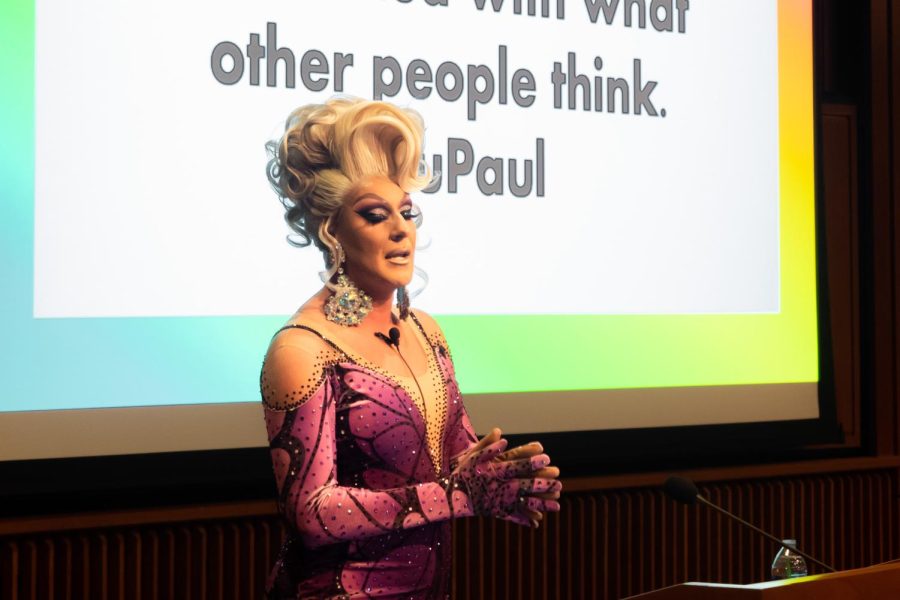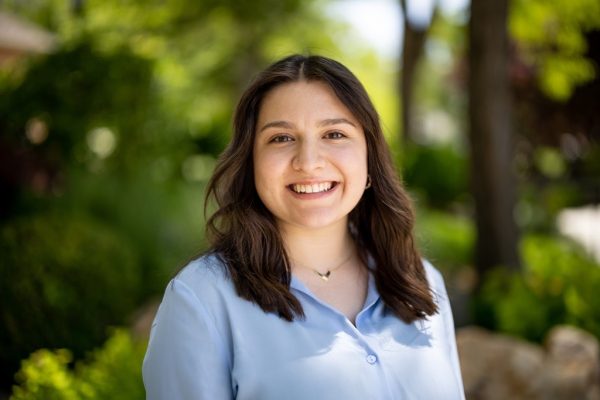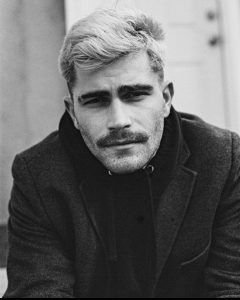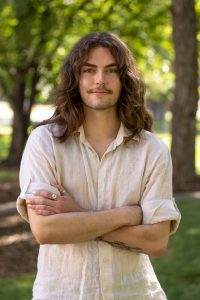Pride Week at the U: Drag Queen Storytime with Gia Bianca Stephens
Gia Bianca Stephens speaking at the The Drag Queen Story Time event at the Gould Auditorium on the first floor of the J. Willard Marriott Library on Thursday, March 30, 2023. (Photo by Jack Gambassi | The Daily Utah Chronicle)
March 31, 2023
During the University of Utah’s Pride Week, the Marriott Library held a drag queen storytime with Gia Bianca Stephens, where she read “GuRu,” “Rainbow Revolutionaries” and “The Queer Bible.” She talked about hope and being unapologetic as a queer person.
Stephens, who has been a drag queen in Utah for over a decade and is known as the “Salt Lake City Showgirl,” said it’s important to bring events like this to college campuses.
“Queer people are everywhere, and we exist in all places, and whether it’s an institution of higher learning or a church, we’re going to be there,” she said. “I think by being here, it sends a message to any young, terrified [people]: we’re hopeful that things do in fact get better.”
Stephens read excerpts from “GuRu” by RuPaul about the art of drag, chosen family and how to be unapologetic. Reflecting on the ideas from the book, she said dressing up in drag is an art form that can mess with someone’s head.
“You’ve got all these costumes and wigs and you … receive all this love and applause and admiration,” she said. “But when that comes off at the end of the show, you’re left with the human underneath.”
Stephens, Miss Gay New York America 2022, said she attributes the success she’s had in the drag world to “finding my tribe.”
“That’s not just chosen family,” Stephens said. “It’s your coworkers, the friends you meet along the way, but it’s finding those people that give you permission to shine your light as bright as you possibly can.”
Stephens said the wigs, costumes and gowns are all secondary to the impact drag can have on the queer community.
“Living so unapologetically and as uniquely, authentically ourselves, if that allows just one person the comfort level to explore their own gender identity, I absolutely accomplish what I set out to do,” she said.
Sean Sullivan, a modern dance student at the U who grew up in Utah, said “I love drag and the art form that it is. I’ve never really been exposed to the art of drag [in person] until I moved out of my house just because it wasn’t accessible to me where I lived.”
In the event, Stephens read four biographies of people — José Sarria, Harvey Milk, Sylvia Rivera and Marsha P. Johnson — who shaped queer history, from “Rainbow Revolutionaries” by Sarah Prager.
Sarria was a Latino activist and was the first known openly gay man to run for public office. Milk was one of the first openly gay elected U.S. officials. In 1977, Milk was elected to San Francisco’s Board of Supervisors. Rivera and Johnson were heavily involved in the Stonewall Inn uprising in June 1969.
Before reading the last book, Stephens implored allies to show up in new ways, adding that the type of ally-ship shown in 2020 is no longer enough.
“We need the ally-ship to be louder and louder than it ever has before; unapologetic, relentless, and until we have the same rights as everybody else,” she said.
The final book Stephens read was “The Queer Bible” by Jack Guinness, which is a collection of essays written by notable queer figures. Stephens read an excerpt from the essay, “Elton John On Divine,” in which the pop star recounts the impact the character Divine from “Pink Flamingos” had on him.
Stephens, who grew up in South Jordan, Utah related what John termed the “True Punk Rebel” of Divine’s character, and how it was the alternative and punk scenes in the Salt Lake Valley that gave Stephens the freedom to express herself both in and out of drag as a young person.
Utah and the Controversy Around Drag Shows
Students also attended the event due to the national controversy surrounding drag shows.
“I am also coming here just because of all the controversy in our country right now with like drag bans and how problematic conservatives make drag queen story hours sound,” Sullivan said.
In January, five Proud Boys from the Salt Lake City chapter protested an all-ages drag show at Tea Zaanti. Nationally, states across the U.S. are passing anti-drag legislation citing the shows as “promoting obscenity to minors” and are examples of “adult cabaret.” The controversy across the country has made drag shows a battleground of American “culture wars.”
In Utah, “Don’t Say Gay” legislation, which did not pass, would have limited educators on their ability to use LGBTQ+ class material and discuss gender identity and sexuality in class. Organizations like Utah Parents United target queer books as being “sexually explicit.” Drag events are also perceived by some Utahns as “satanic” and an effort to groom children.
Sydney Calderon, a Ph.D. student studying educational leadership and policy at the U said “you need to be able to see what drag really is. In a day like our own the narrative is really distorted and hyper-sexualized.” Calderon added the event felt more like “a teach-in” than a story-time.
Josh Carroll, a first-year political science student, said he believes that campus culture continues to spread awareness and appreciation for the queer community at the U.
“These events expose people to the great parts of the queer community,” Carroll said. “They make people feel welcome no matter how they feel about it to actually have a discussion instead of having it in a corner.”
Stephens, throughout the event, repeatedly spoke positively about Utah and its queer community.
“We have talked a lot about the darkness that surrounds the queer story, but the reality is Utah is a lot more,” Stephens said. “The Utah I hear about on the news and on Capitol Hill, that’s not the Utah I live in.”










